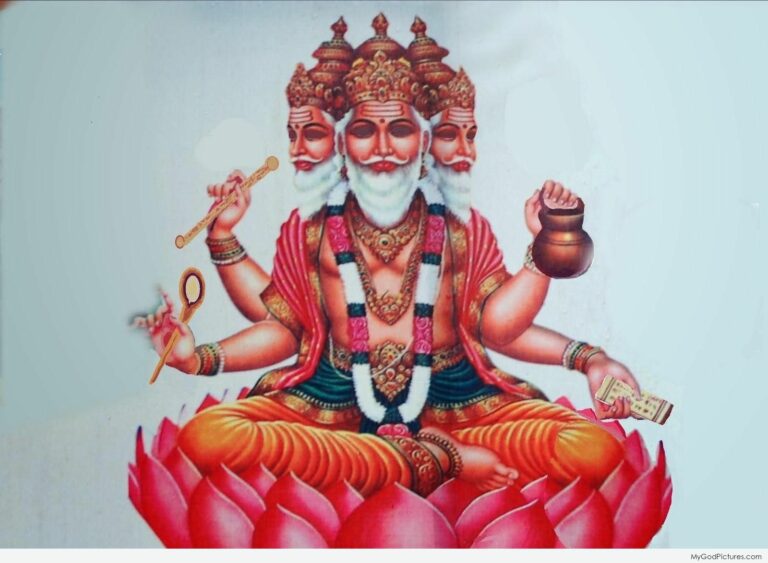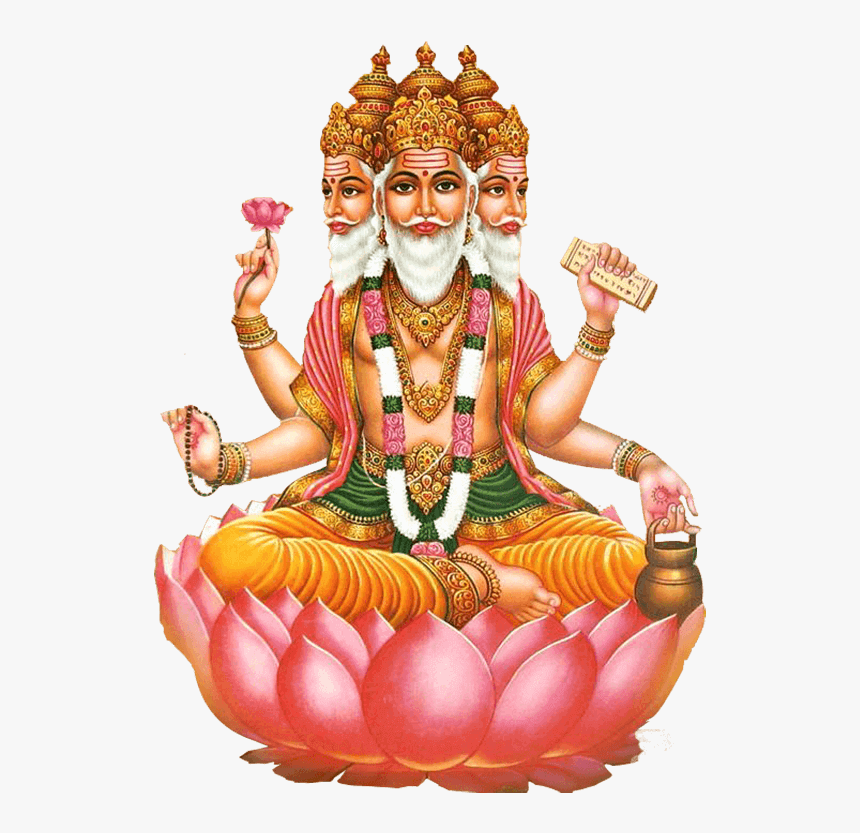Meaning
Brahma in Hinduism
- Brahma stands as one of the primary deities within the Hindu trinity, known as theTrimurti.
- He represents creation, often depicted with four heads symbolizing the four Vedas – the sacred texts of Hinduism.
- The concept of Brahma is deeply intertwined with the cosmological understanding in Hinduism.
- Hindu scriptures describe him as the originator of the universe, emerging from a cosmic egg known as Hiranyagarbha.
- Brahma’s role is not merely physical creation but also the conceptual and intellectual foundation of existence.
- He is considered the creator of all beings, including gods and goddesses, and the source of all knowledge and wisdom.
- Interestingly, Brahma’s prominence in worship and iconography diminished over time compared to Vishnu and Shiva, who represent preservation and transformation respectively.
- This shift reflects a change in focus within Hinduism from primordial creation towards themes of cyclical existence and liberation.
- Despite this relative obscurity, Brahma continues to be revered as the progenitor of the universe and the embodiment of creative energy.
- His name “Brahma” itself is believed to derive from the Sanskrit root “brahman,” signifying ultimate reality or cosmic consciousness.
- This connection underscores the fundamental link between creation and the divine essence that pervades all things.
Universal Creator
Brahma is one of the principal deities in Hinduism, representing creation. His name is deeply intertwined with the Sanskrit word “brahma,” which carries a multifaceted meaning encompassing both the cosmic principle of creation and the ultimate reality.
Etymologically, “brahman” refers to the primordial essence from which the universe arises, the divine ground of being. It signifies the transcendent, unmanifest reality that precedes existence as we know it.
Brahma, therefore, embodies this creative force, the power that brings forth all things from the void. In Hindu cosmology, he is often depicted with four heads symbolizing the four Vedas, the sacred texts of Hinduism, and four arms holding various implements, each representing a different aspect of creation.
The origins of Brahma’s worship can be traced back to ancient Vedic traditions, though his role as the principal creator deity gained prominence during the later period known as the Puranic era.
Brahma’s story is intricately woven into Hindu mythology. According to legend, he emerged from a golden egg (hiranyagarbha) floating in the cosmic ocean of existence (cosmic waters). This primordial egg symbolizes the potential for creation contained within the ultimate reality.
From this cosmic womb, Brahma initiated the process of creation, giving rise to the heavens, earth, and all that exists between. He is credited with establishing the cosmic order (rta) and shaping the universe according to divine design.
While Brahma’s role in Hinduism is significant, his popularity declined over time compared to other deities like Vishnu and Shiva.
Origin
Sanskrit Roots
Brahma is one of the principal deities in Hinduism, representing creation. His name originates from the Sanskrit root bhrā́-, meaning “to swell,” “to expand,” or “to create.” This root reflects Brahma’s role as the cosmic architect who brings forth the universe from primordial chaos.
In ancient Hindu scriptures, such as the Rig Veda, Brahma is described as a four-headed deity with four faces symbolizing the four Vedas, the sacred texts of Hinduism. Each face is said to represent a different aspect of creation and knowledge. Brahma is often depicted seated on a lotus flower, which emerges from the navel of Vishnu, the preserver god. This imagery symbolizes the emergence of the universe from the depths of cosmic existence.
The Sanskrit word brahman, closely related to Brahma, denotes the ultimate reality or the divine essence underlying all creation. This concept transcends individual gods and goddesses, representing the universal consciousness that permeates everything.
Connection to Vedic Literature
Brahma, the creator god in Hinduism, derives its name from the Sanskrit root brh, meaning “to expand,” “to grow,” or “to create.” This etymology inherently connects Brahma to the act of creation and the expansion of the universe.
In the Vedas, the earliest sacred texts of Hinduism, Brahma emerges as a central figure associated with cosmic creation. While not explicitly named as “Brahma” in the Rig Veda (the oldest Vedic text), hymns allude to a primordial deity responsible for bringing forth existence from non-existence. This concept aligns with Brahma’s role as the first of the three primary deities in the Hindu trinity – Brahma, Vishnu, and Shiva – representing creation, preservation, and destruction respectively.
The Upanishads, philosophical texts that emerged later within the Vedic tradition, further elaborate on Brahma’s nature. These scriptures depict him as a self-effulgent being, emanating from the Absolute Reality known as Brahman (the ultimate source of all existence). Brahma is seen as an emanation of Brahman, responsible for manifesting the universe through his creative power.
The Puranas, ancient Hindu epics that narrate myths and legends, provide detailed accounts of Brahma’s exploits and interactions with other deities. These narratives often depict him as a wise and benevolent creator, overseeing the order and harmony of the cosmos. However, they also portray his role in fostering creation through sacrifice and ritual, emphasizing the interconnectedness between divine action and cosmic order.
The name “Brahma” therefore holds deep significance within Hinduism, reflecting not only the act of creation but also the inherent connection between the material universe and its ultimate source. It embodies the idea of a self-originating power responsible for bringing forth existence from nothingness, a concept deeply rooted in Vedic thought.
History
Ancient Depictions
Brahma is a revered deity in Hinduism, representing creation and the cosmic intelligence behind the universe’s unfolding. His name’s etymology points to a profound connection with the act of bringing forth existence.
The Sanskrit word “Brahma” is believed to be derived from the root “brah”, which signifies “to expand,” “to grow,” or “to create.” This root also underlies words like brahman, denoting the ultimate reality, cosmic principle, and divine essence.
Ancient Indian scriptures, particularly the Vedas and Upanishads, are filled with hymns and philosophical discussions that explore Brahma’s multifaceted nature. He is often depicted as a four-headed deity, each head symbolizing a different Veda—the Rigveda, Samaveda, Yajurveda, and Atharvaveda. This representation underscores his role as the source of all knowledge and wisdom.
In many depictions, Brahma rides a swan, which embodies purity and spiritual enlightenment. The swan’s ability to discern nectar from poison symbolizes Brahma’s discerning intellect and his power to separate truth from falsehood.
Ancient Hindu texts frequently illustrate Brahma seated on a lotus flower emanating from the navel of Vishnu, the preserver deity. This imagery signifies that creation emerges from the divine realm, signifying Vishnu’s role in sustaining the universe and Brahma’s role as its creator.
Over time, the concept of Brahma evolved alongside other deities within the Hindu pantheon. While he remains a central figure in cosmology and philosophical discourse, his prominence has shifted in some traditions compared to Vishnu and Shiva, who are often more widely venerated.
Evolution of Iconography
- Brahma is one of the principal deities in Hinduism, representing creation.
- The name Brahma derives from the Sanskrit root brahman, which signifies “to expand,” “to grow,” or “to create.”
- This root also gives rise to the term Brahman, denoting the ultimate reality or the divine essence that permeates all existence.
- Therefore, Brahma’s name intrinsically links him to the act of creation and the fundamental principle of cosmic reality.
- Ancient texts, such as the Rig Veda, contain hymns praising a creator deity often associated with the cosmic egg (Hiranyagarbha) and the unfolding of the universe.
- While these hymns do not explicitly name Brahma, they lay the groundwork for his later development as the principal god of creation in Hinduism.
- Best LeadsGorilla Alternatives for 2025 - April 26, 2025
- Best Overloop Alternatives for 2025 - April 25, 2025
- Best Lead411 Alternatives for 2025 - April 25, 2025


